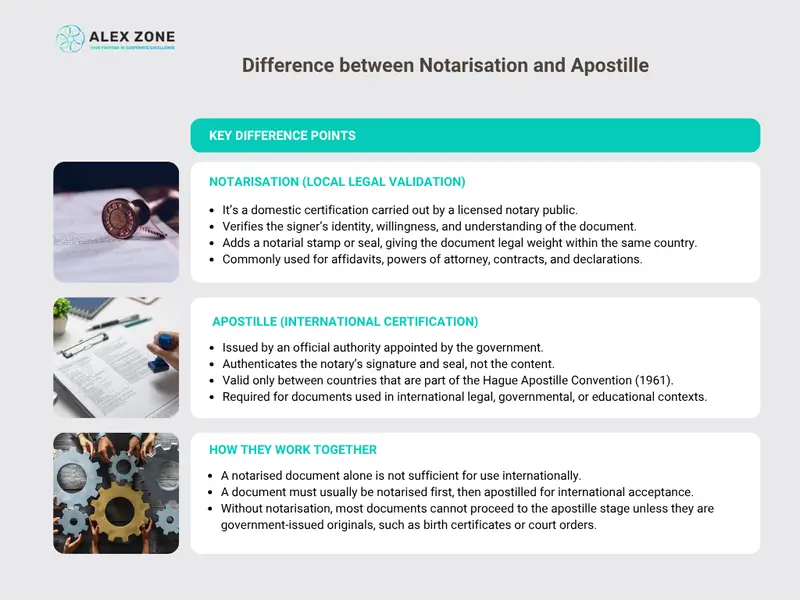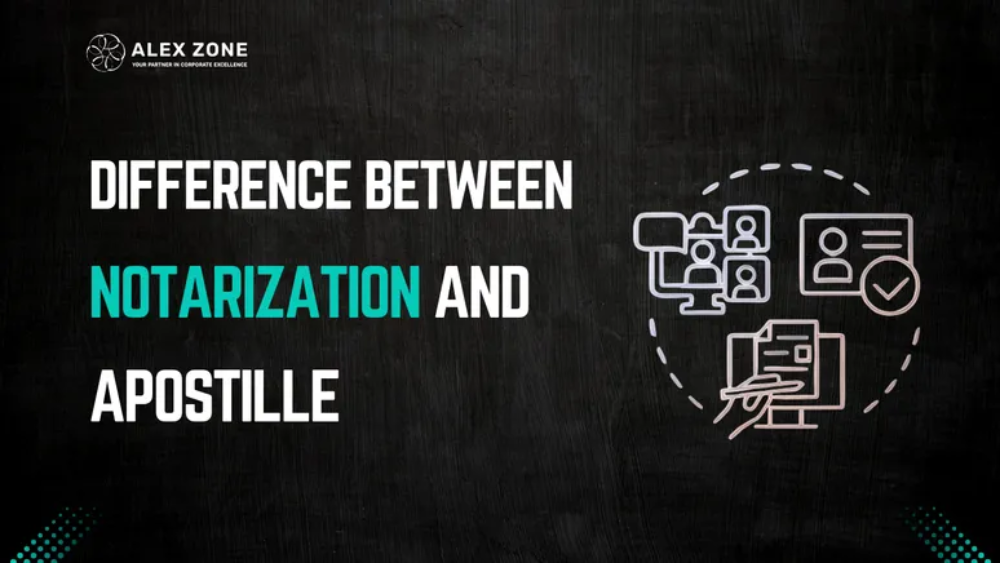Planning to use your documents abroad?
Then you need to know the difference between notarisation and apostille, as both processes help validate your paperwork for legal use across borders. While they might sound similar, they serve very different purposes.
In this simple guide, we’ll break down the difference and show you how Alexzone makes certificate attestation in Dubai fast, easy, and hassle-free, for both personal and business needs.
Let’s get started and learn everything you need to know!
What is the Meaning of Notarisation?
Understanding the difference between notarisation and apostille begins with defining what notarisation actually means.
Notarisation is the process by which a qualified public official, called a notary public, verifies the authenticity of signatures on legal documents, ensuring they are signed willingly and with full understanding.
Key points to understand notarisation:
- Confirms the identity of the signer through ID verification.
- Requires in-person witnessing to prevent fraud.
- Adds a notarial seal or stamp to certify the act.
- Commonly required for documents like contracts, affidavits, and powers of attorney.
- Gives documents legal weight within the same country.
Unlike an apostille, notarisation does not validate the content, but it gives your document legal weight within the same country.
In many international processes, notarisation and apostille work together to ensure your documents are both legally verified and internationally recognized.
What Is an Apostille?
To understand the difference between notarisation and apostille, you must first know what an apostille is.
An apostille is a certified document that verifies the authenticity of a public official’s signature or seal for use abroad.
Key facts about apostilles include:
- Issued under the Hague Apostille Convention.
- Recognized only by countries party to the convention.
- Confirms the legitimacy of notaries or public officers, not the document’s content.
- Commonly used for documents like birth certificates, diplomas, and legal affidavits.
Unlike notarisation, which involves the person signing the document, an apostille focuses on verifying the official authority.
It’s an essential part of international documentation, especially when dealing with countries that require both notarisation and apostille for legal validity.
Difference Between Notarisation and Apostille

Understanding the difference between notarisation and apostille is crucial when preparing legal documents for international use. While both processes aim to validate documents, they operate at different levels and serve distinct legal functions.
Here’s a more detailed breakdown of how notarisation and apostille differ:
1. Notarisation (Local Legal Validation)
- Notarisation is a domestic certification carried out by a licensed notary public.
- Verifies the signer’s identity, willingness, and understanding of the document.
- Adds a notarial stamp or seal, giving the document legal weight within the same country.
- Commonly used for affidavits, powers of attorney, contracts, and declarations.
2. Apostille (International Certification)
- Issued by an official authority appointed by the government.
- Authenticates the notary’s signature and seal, not the content.
- Valid only between countries that are part of the Hague Apostille Convention (1961).
- Required for documents used in international legal, governmental, or educational contexts.
3. How They Work Together
- A notarised document alone is not sufficient for use internationally.
- A document must usually be notarised first, then apostilled for international acceptance.
- Without notarisation, most documents cannot proceed to the apostille stage unless they are government-issued originals, such as birth certificates or court orders.
Can You Apostille a Document Without Notarisation?
When preparing documents for international use, it’s important to know whether notarisation is required before obtaining an apostille. Although both processes contribute to document authentication, they serve different purposes and apply to different types of documents.
Here are key points to consider regarding notarisation and apostille:
- Public documents like birth certificates or court decisions often do not require notarisation before receiving an apostille.
- Private documents, such as contracts or statements, usually must be notarised first to verify the signer’s identity.
- Apostille authorities certify the signature or seal, not the document’s content.
- Some jurisdictions require both notarisation and apostille, even for public records.
- Always consult the competent authority in your country for specific rules.
Knowing the difference between notarisation and apostille ensures you prepare your documents correctly, avoid delays, and meet the legal standards for international recognition.
How to Get Something Notarized?
Getting your documents notarised doesn’t have to be stressful. At Alexzone, we make the process fast, secure, and seamless for both individuals and businesses. Whether you’re handling contracts, legal declarations, or personal affidavits, our certified notary experts ensure every document is legally binding and fully compliant with both local and international standards.
As part of our trusted certificate attestation services in Dubai, we offer end-to-end support to ensure your documents are recognised and accepted worldwide.
Our Notarisation Services Include:
- On-site and remote notarisation options.
- Multilingual support for international documents.
- Same-day service for urgent needs.
- Full guidance on notarisation and apostille procedures.
With Alexzone, your notarised documents are handled with the highest level of accuracy, confidentiality, and professionalism, ensuring they are fully accepted wherever they need to go.
Contact Us Today to Simplify Your Notarisation, so you can focus on what matters!
Frequently Asked Questions
Q1: What is the main difference between notarisation and apostille?
The difference between notarisation and apostille lies in their function: notarisation verifies the signer’s identity, while apostille authenticates the notary’s authority for international use.
Q2: Do I need both notarisation and apostille for my documents?
Yes, in many cases you need both.
First, your document is notarised, then the apostille is added to confirm its validity abroad.
Q3: Can I get an apostille without notarising my document first?
No, in most jurisdictions, a document must be notarised before it can receive an apostille.
Q4: Are notarisation and apostille accepted in all countries?
- Apostilles are accepted in countries that are part of the Hague Apostille Convention.
- Notarisation may still be required even in these countries for initial verification.
Q5: How do I know if my document requires notarization or an apostille?
Check with the receiving country’s legal requirements or consult with a legal or document authentication expert for accurate guidance.
For a free consultation, contact us now and let us help you choose the best for your project.


Leave Your Comment